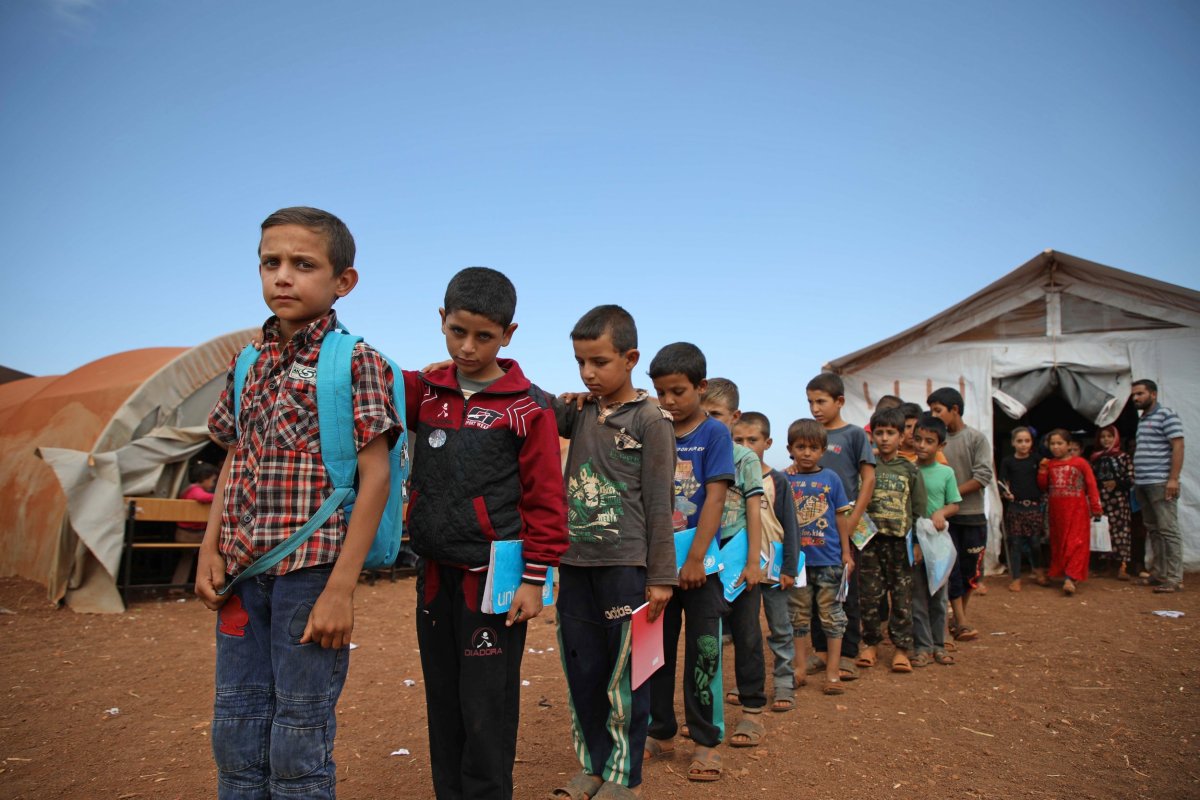We are currently in the middle of the worst displacement crisis in history. Worldwide, more than 68 million people have been forced from their homes. More than 25 million are refugees, and nearly half are children. At a time like this, the world needs leadership from the United States, which over the years has led global efforts to resettle a small portion of the world's most at-risk refugees.
President Trump, however, is trampling on this proud tradition. His administration announced plans to lower the refugee admissions target for the next fiscal year to 30,000, breaking his own dubious record of 45,000. The full picture is even dimmer because the administration has failed to meet even the low bar it set for itself. The resident's refugee bans, along with the addition of more hurdles and logjams in vetting, are choking off resettlement. The resettlement infrastructure itself is coming apart as offices around the country are forced to shut down or scale back. This year, the United States—which has resettled on average 80,000 refugees per year since the inception of the program in 1980—has resettled only about 20,000, less than half its goal for the fiscal year that ends this week.
President Trump would have you believe that he's looking out for the United States, putting "America First." On the contrary, he's weakening the country. As an ambassador to six countries under both Republican and Democratic presidents, I saw firsthand the power of American leadership on refugee resettlement. Not only did it save lives; it helped strengthened U.S. credibility, leverage, and alliances, enabling our country to pursue its own strategic interests.
As America steps back, no other country will lead. Indeed, there is a massive worldwide shortfall in resettlement slots. The U.N. refugee agency says that in 2017 it resettled only 65,100 out of the estimated 1.2 million particularly vulnerable refugees who needed to be brought to safety. The United States has the capacity to put a major dent in the shortfall. But it lacks the will. It's not quite accurate to say that the United States is failing to lead by example; it's showing other wealthy countries how to abdicate moral responsibility. And giving up the leverage to encourage them to do more.
This is shameful, a frontal assault on American ideals that will increase the suffering of people who have already suffered greatly. Fewer refugees facing acute risks or in hiding will reach safety. Some will die as a result. Those in danger include Iraqis and Afghans targeted by terrorists because they worked for the United States. This is an especially personal issue for me. As ambassador to Iraq and Afghanistan, I worked with hundreds of people who, in hopes of helping their country, risked their lives by supporting the United States and the U.S. military.
By rolling back resettlement, however, the United States hurts not only refugees but also itself. The responsibility for taking in refugees during this crisis has fallen heavily on U.S. allies and other front-line countries such as Turkey, Jordan, Lebanon, Uganda, and Kenya. By sharing in this responsibility, the United States would relieve the strain on these countries, helping to secure their stability and reduce the potential for escalating regional volatility. The Trump administration's approach, by contrast, leaves these countries in the lurch and weakens U.S. national security. To make matters even worse, the Trump Administration has proposed deep cuts to foreign refugee assistance.
This wrong-headed approach and its scapegoating of refugees is also increasing pressure on U.S. allies in Europe. The influx in Europe is a political weapon in the hands of neo-fascist movements and authoritarian leaders, who are using it to sow division and push repressive policies. Only an authoritarian himself would view this development as anything but a grave threat to American interests.

Secretary of State Mike Pompeo claimed the lowered cap protects U.S. national security, saying the administration is "prioritizing the safety and well-being of the American people." The U.S. government, however, has vetted hundreds of thousands of refugees while safeguarding security. In fact, refugees have long been the most thoroughly screened travelers to the United States. The Trump administration's decision to subject even more refugees to extra security advisory checks, accompanied by the sharp reduction in the number of checks actually conducted by the FBI, makes clear that the administration's aim is to grind refugee resettlement to a near standstill.
Congress should push President Trump to raise the yearly target to 75,000, a modest number that would nonetheless reflect a meaningful commitment. Congress should also press the administration to unclog the screening process and take up the Pentagon's offer to loan staff to the FBI, a move that could help prompt the conduct and completion of more security checks in a timely and accurate manner.
The stakes are too high for Congress simply to acquiesce. Although there was never a halcyon time when U.S. refugee policy was free of political considerations, there was an enduring bipartisan consensus that made the United States—as President Reagan put it—"a magnet for all who must have freedom, for all the pilgrims from all the lost places who are hurtling through the darkness, toward home."
The Trump administration's retreat in leadership and assault on the nation's honorable tradition of refugee settlement threaten to redefine the United States. Nothing, I submit, is more worthy of resistance than that.
Ryan Crocker is former ambassador to Afghanistan, Iraq, Pakistan, Syria, Kuwait, and Lebanon.
The views expressed in this article are the author's own.
Uncommon Knowledge
Newsweek is committed to challenging conventional wisdom and finding connections in the search for common ground.
Newsweek is committed to challenging conventional wisdom and finding connections in the search for common ground.
About the writer
To read how Newsweek uses AI as a newsroom tool, Click here.








